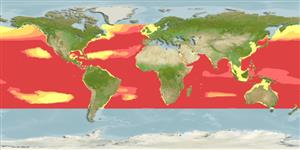Common names from other countries
Environment: milieu / climate zone / depth range / distribution range
Écologie
marin bathypélagique; profondeur 16 - 4663 m (Ref. 58302), usually 600 - 1800 m (Ref. 58302). Deep-water; 61°N - 40°S, 180°W - 180°E
Atlantic, Indian and Pacific: in tropical to temperate waters. Southern Ocean: Indian Ocean sector south of Australia. South China Sea (Ref.74511).
Length at first maturity / Taille / Poids / Âge
Maturity: Lm 4.3 range ? - ? cm
Max length : 4.8 cm SL mâle / non sexé; (Ref. 5162); 7.5 cm SL (female)
Description synthétique
Clés d'identification | Morphologie | Morphométrie
Épines dorsales (Total) : 0; Rayons mous dorsaux (Total) : 12 - 15; Épines anales: 0; Rayons mous anaux: 16 - 19. Light to dark brown in color; transparent or slightly pigmented immediately anterior to anal and dorsal origin; median fin rays and internasal area pigmented; meningeal pigment extending to level of rear margin of eye (Ref. 3991).
Meso- to bathypelagic (Ref. 58302). Oceanic, precise depth range dependent upon developmental stage, latitude, season (Ref. 4769). Does not exhibit diel vertical migrations (Ref. 4769). Lipid content is 2.3 % in fresh body weight and wax ester is 34.0 % in total lipids (Ref. 9193).
Life cycle and mating behavior
Maturities | Reproduction | Spawnings | Egg(s) | Fecundities | Larves
Gon, O., 1990. Gonostomatidae. p. 116-122. In O. Gon and P.C. Heemstra (eds.) Fishes of the Southern Ocean. J.L.B. Smith Institute of Ichthyology, Grahamstown, South Africa. 462 p. (Ref. 5162)
Statut dans la liste rouge de l'IUCN (Ref. 130435)
CITES (Ref. 128078)
Not Evaluated
Menace pour l'homme
Harmless
Utilisations par l'homme
Pêcheries: sans intérêt
Outils
Articles particuliers
Télécharger en XML
Sources Internet
Estimates based on models
Preferred temperature (Ref.
115969): 2.5 - 8.7, mean 4.2 (based on 3651 cells).
Phylogenetic diversity index (Ref.
82804): PD
50 = 0.5001 [Uniqueness, from 0.5 = low to 2.0 = high].
Bayesian length-weight: a=0.00389 (0.00171 - 0.00885), b=2.99 (2.79 - 3.19), in cm Total Length, based on LWR estimates for this (Sub)family-body shape (Ref.
93245).
Niveau trophique (Ref.
69278): 3.2 ±0.36 se; based on food items.
Résilience (Ref.
120179): Milieu, temps minimum de doublement de population : 1,4 à 4,4 années (tm=3.5).
Fishing Vulnerability (Ref.
59153): Low vulnerability (10 of 100).
